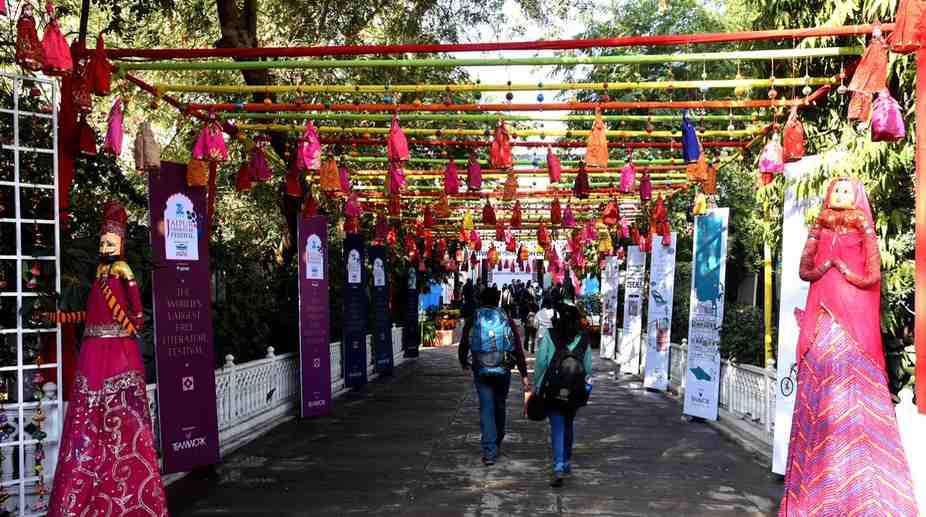Imtiaz Ali shuts down ‘Jab We Met’ sequel rumors, talks women in cinema at JLF 2025
Imtiaz Ali revealed he has no plans for a 'Jab We Met' sequel, citing a lack of new story potential. He also discussed the evolving portrayal of women in cinema.

Jaipur Literature Festival (Photo: Twitter)
An international literary prize awarded annually to writers of any ethnicity or nationality writing about South Asian themes, the DSC Prize for South Asian Literature has grown into one of the most coveted literary awards since its inception in 2011. But when the prize moved out of the Jaipur Literature Festival (JLF) in 2015, many in literary circles thought that its end was nigh. The idea, according to DSC’s founder Surina Narula, was simple — to move beyond borders.
“The Jaipur Literature Festival was a baby when we funded it, and it was fine then; but once the festival started finding its feet, there was no stop to it. It became bigger and bigger with every passing year and everything else got lost in it. The DSC prize was getting lost in the Jaipur Literature Festival.
Advertisement
“It was one of the small things happening there. We wanted it to have more visibility and be noticed by writers and people in a more prominent way. We wanted to move beyond borders and take the award to all of the countries in South Asia about which it is,” Narula told IANS in an interview.
Advertisement
Today the $25,000 prize has now grown into something much larger than perhaps what it even set out to be. Apart from receiving numerous nominations from all leading publishing houses, the previous awardees proudly mention the award on their book covers and the announcement of its long lists and short lists receive huge media coverage.
Narula also said that the much-coveted prize shares the same idea that we associate with literature — that it is boundary-less.
“What does reading do? It helps you understand one another. So our intention is to enhance the understanding about the region among people. We are moving beyond borders and trying to spread the word about the region among people,” she said.
And why not, if you look at how the festival is travelling across South Asia, from India to Sri Lanka and now from Sri Lanka to Bangladesh. So what is the difference that Narula sees when the prize is awarded in a different country every year?
“There is a lot more excitement about the prize now. The Prime Minister of Sri Lanka presented the prize to the winner last year. This shows how well it has been able to make a place for itself in the minds of people. What more excitement can there be? The Prime Minister said that what the DSC Prize is doing for the region, SAARC has not been able to do. This prize also enhances the festival in which it is given. The festival in Dhaka or Sri Lanka also gets a boost,” Narula maintained.
Indo-Australian writer Aravind Adiga, winner of the Man Booker Prize 2008, has been shortlisted along with four other writers for the this year’s prize, which will be announced at the Dhaka Literature Festival in November.
“There has already been a lot of anticipation for this year’s prize. I think the writing community in Bangladesh is very excited and receptive to the prize. And because the prize is about South Asia, it is very crucial to take it to each of these countries that together form the region.
“You cannot measure the impact of anything that is philanthropic in nature… for me, personally, it has been a great learning experience. I have interacted with the jury members, I have discovered such powerful novels about the region; it has enhanced me both as a person and as somebody who is involved in philanthropy,” Narula said.
Narula is also the President and co-founder of the Consortium for Street Children (CSC) — a network of over 65 UK-based development agencies — and has previously been its Co-Chair and Trustee.
Reflecting on the initial days of the prize, Narula said that the idea was born after the DSC began sponsoring JLF.
“In the second or third year itself, we realised that there is no prize for South Asian literature. And I was sort of getting to understand what this region’s literature is. We have all grown up in English medium schools but reading South Asian literature brought me a lot closer to understanding the region’s social and cultural realities. How similar are our eight countries! There is something that binds us together. So the idea to institute this prize came about after a lot of discussion,” she recalled.
Narula added that the award is “more unbiased” when it is given by a non-state actor.
“There is no politics involved and the jury is very unbiased. The Sahitya Akademi may have its limitations, because it is ultimately given by the government. So I think the award is more interesting because it goes to anybody of any ethnicity from the South Asian region; the only deciding factor is the potential of their craft,” she said.
So will the prize return to Jaipur any time in future?
“Why not? (JLF co-director) Namita Gokhale is a very dear friend of mine; I also work with street children; so (JLF producer) Sanjoy Roy is another close friend,” she said.
Advertisement